Exploring Causes of the Civil War – Part IX: The Debate Over the War’s Inevitability
A review of the literature reveals – not surprisingly – a lack of agreement over whether the American Civil War was inevitable. Given the fact that it did occur, the question under consideration might be better stated as “at what point in time” did the American Civil War became unavoidable.
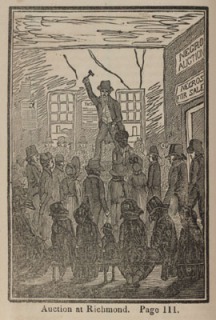 Some would argue that war became predestined at the point when the slave trade was first introduced to the colonies. Others have suggested that civil war became preordained when the founding fathers created a Constitution that professed freedom for all but failed to deal with the country’s practice of chattel slavery (image left of slave auction at Richmond). But portions of the country had demonstrated a willingness to move away slavery. And there was some indication that even slave owners in the south did not expect the practice to go on indefinitely. Certainly the rise of King Cotton, made feasible by the invention of the cotton gin and cotton varieties more suited to the southern climate, slowed the inclination to move away from slavery. Even so, the country had opportunity and demonstrated an ability to find compromise on the issues surrounding slavery time and again and could have
Some would argue that war became predestined at the point when the slave trade was first introduced to the colonies. Others have suggested that civil war became preordained when the founding fathers created a Constitution that professed freedom for all but failed to deal with the country’s practice of chattel slavery (image left of slave auction at Richmond). But portions of the country had demonstrated a willingness to move away slavery. And there was some indication that even slave owners in the south did not expect the practice to go on indefinitely. Certainly the rise of King Cotton, made feasible by the invention of the cotton gin and cotton varieties more suited to the southern climate, slowed the inclination to move away from slavery. Even so, the country had opportunity and demonstrated an ability to find compromise on the issues surrounding slavery time and again and could have 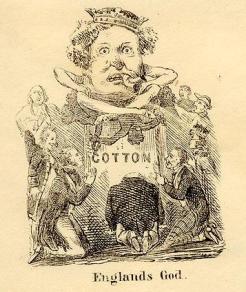 conceivably continued to do so had other factors not pushed the country to war.
conceivably continued to do so had other factors not pushed the country to war.
Sectional differences, well evident even in colonial days, had the potential to make civil war predestined but historian Avery Craven suggests otherwise. “Physical and social differences between North and South did not in themselves necessarily imply an irrepressible conflict. They did not mean that civil war had been decreed from the beginning by Fate.”[i] He points out that the federal system created by the founding fathers had room for differences and that England herself adopted the model of American federalism and used it to manage widely disparate regions.[ii]
 Kenneth Stampp in his work, America in 1857: A Nation on the Brink, suggests that “…1857 was probably the year when the North and South reached the political point of no return — when it became well nigh impossible to head off a violent resolution of the differences between them.”[iii] Stampp identified three primary factors that catapulted the country toward disunion within that twelve month period.
Kenneth Stampp in his work, America in 1857: A Nation on the Brink, suggests that “…1857 was probably the year when the North and South reached the political point of no return — when it became well nigh impossible to head off a violent resolution of the differences between them.”[iii] Stampp identified three primary factors that catapulted the country toward disunion within that twelve month period.
-
The first was the increase in sectional conflict centered on Kansas.
-
The second was President Buchanan’s fall from grace among most of the Northerners who had voted for him after he supported the Lecompton Constitution and thus broke his pre-election promises. This sparked one of the most vicious debates in Congress and led to…
-
the third happening which was the crisis that occurred in the national Democratic Party from which “it did not recover until after the Civil War.”[iv] That schism in the party opened the way for Abraham Lincoln’s candidacy for the presidency which in turn raised sectional tensions between North and South to new heights.
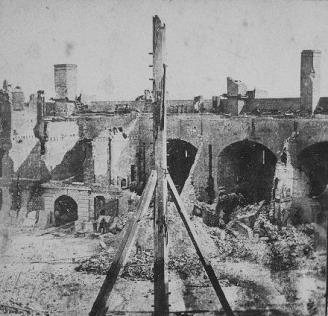 Civil War historiographer Gobar Boritt suggests that the American Civil War only became inevitable after the attack on Fort Sumter (pictured right after surrender) and with this I agree. “The popular uprising, North and South, that followed the fight over Sumter, combined with willing leadership on both sides, made the Civil War inevitable. It was not that before.”[v] Boritt acknowledges that “the probability of war” continued to grow in the 1850s, but that “the country’s fate was not sealed until the ides of April, 1861.”[vi]
Civil War historiographer Gobar Boritt suggests that the American Civil War only became inevitable after the attack on Fort Sumter (pictured right after surrender) and with this I agree. “The popular uprising, North and South, that followed the fight over Sumter, combined with willing leadership on both sides, made the Civil War inevitable. It was not that before.”[v] Boritt acknowledges that “the probability of war” continued to grow in the 1850s, but that “the country’s fate was not sealed until the ides of April, 1861.”[vi]
My conclusion is that the American Civil War was not inevitable but was, rather, the result of a confluence of factors which – taken in aggregate and flared by extremists – resulted in a war unwanted by the majority of Americans. Contributory to the war was the influence of specific individuals – not the least of which was Abraham Lincoln himself. Other politicians, by their action or inaction at critical moments, also had part to play in the circumstances that led to war. Debate over the war’s inevitability has been and will continue to be rigorous.
This post concludes a series on Exploring Causes of the Civil War. Other posts can be read by clicking on any of the following links: Part I: Introduction, Part II: Antebellum America, Part III: The Antebellum South, Part IV: The Antebellum North, Part V: The Rise of Sectional Disputes, Part VI: The Contribution of Constitutional Ambiguity, Part VII: Political Discord, Slavery, and the Fight for Political Control, and Part VIII: The Influence of the Individual.
As always, I invite your comments.
© 2007 L. Rene Tyree
___________________
Photo Credits:
Slave Auction, Richmond, Virginia, 1830. [Source: University of Virginia. Imaged reference: Bourne01. George Bourne, Picture of slavery in the United State of America. . . (Boston, 1838).
Cotton – England’s God [Pictorial envelope] [LOC CALL NUMBER PR-022-3-14-19]
Fort Sumter after evacuation, flagpole shot away twice. [Stereograph], 1861. [LOC CALL NUMBER PR-065-798-22
Endnotes:
[i] Avery Craven. The Coming of the Civil War. 2nd Ed. (Chicago: The University of Chicago Press, 1957), 1.
[ii] Ibid.
[iii] Stampp, Kenneth M. America in 1857: A Nation on the Brink. Vers. [book on-line] Internet. Questia.com.New York: Oxford University Press. 1990. available from questia.com, http://www.questia.com/PM.qst?action=openPageViewer&docId=24268497 (accessed September 1, 2007), viii.
[iv] Ibid.
[v] ” ‘And the War Came’? Abraham Lincoln and the Question of Individual Responsibility” in Why the Civil War Came., ed. Gabor S. Boritt (New York: Oxford University Press, 1996), 6.
[vi] Ibid.


















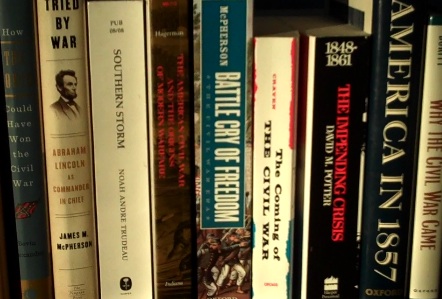


























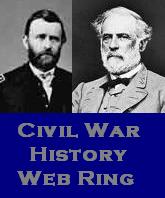

I suspect that disagreements over inevitability arise to some extent because people are considering slightly different issues. On the one extreme, even after the lower south seceded, war — physical violence — could have been avoided if Lincoln had decided not to fight. But many, I think, are really talking about disunion or war: when did it become inevitable that at least some southern states would secede and not return to the Union without coercion? If I had to pick an event, I guess I’d say that Georgia’s vote for secession, which created a physically contiguous bloc of states that could form a potentially viable nation, made secession or war inevitable. Elements in the North and Upper South continued to hope that the lower south would peaceably return, but as far as I’m aware the evidence is overwhelming that there was no inclination in the Cotton South to reconsider the issue. After that, the North (whether it knew it or not) had only two choices: fight or accept a de facto partition.
elektratig
December 23, 2007 at 10:46 am
Inevitability falls into the logical fallacy of “post hoc, ergo propter hoc,” and should be avoided as such. Declaring events as inevitiable ignores contingency & demonstrates a teleologic historical approach that is shunned by serious scholars.
John Maass
December 27, 2007 at 7:30 pm
Wow! What an excellent blog. I have learned a lot of new information. Thank you for sharing your education.
KTrader
November 29, 2009 at 6:07 pm
Sure, the war was avoidable, but not by Lincoln. Lincoln was bending over backwards and forwards and sideways to avoid war.
Was WW2 inevitable? After the Japanese bombed Pearl Harbor, I don’t think so. I guess you could say FDR could have just given the Japanese what they wanted.
The Southern leaders issued Ultimatums exactly as the Japanese did — and then, like the Japanese, when their ultimatums were not met, they attacked.
The Southern Ultimatums are easily the most overlooked event of March 1861. Southern leaders in Montgomery, as soon as they declared secession, then issued Five Ultimatums, promising war if slavery was not spread for them.
That’s right – the Southern leaders issued war ulatimatums that the NORTH must spread slavery. Not that they could spread slavery, but that the North had to.
See the Southern newspapers in March of 1861, about the Southern Ultimatums. Southern headlines read “THE TRUE ISSUE” – when sharing the Ultimatums with the population. This areticle in Richmoond was reprinted in the South and North at the time.
The Five Ultimatums were not just the rantings of power drunk leaders in Montgomery, these were the same five things the South had demanded for 60 years. In fact, the Ultimatums say as much.
New York newspapers suggested Lincoln should give in to the South’s demand, to avoid a war. They didn’t care of the US Congress was just ordered to spread slavery into Kansas – just do it, and lets get on with living.
The lunacy of the Ultimatums is mind numbing — they didn’t even have a pretense of state’s rights, in fact, they were violently opposed to states rights. They specifically said states would have no right to decide issues about slavery or blacks or their own court systems or laws. Although the Ultimatums didn’t say who would make those decisions, they people and the legistlatures were barred from making such decisions.
Slavery, said the first Ultimatum MUST be spread into the territories — they meant, of course, Kansas. Kansas had just voted 98% to 2% to keep slavery out forever. Never mind that, Kansas must accept and respect slavery.
Given the Southern Ultimatums, and then their attack when Lincoln would not obey their demands, the war was inevitable.
But — the Southern leaders didn’t have to attack. They didn’t have to enslave millions. They didn’t have to issue war ultimatums to spread slavery.
So the question of inevitability depends on your grasp of logic, and cause-effect.
Mark
February 22, 2011 at 1:00 pm